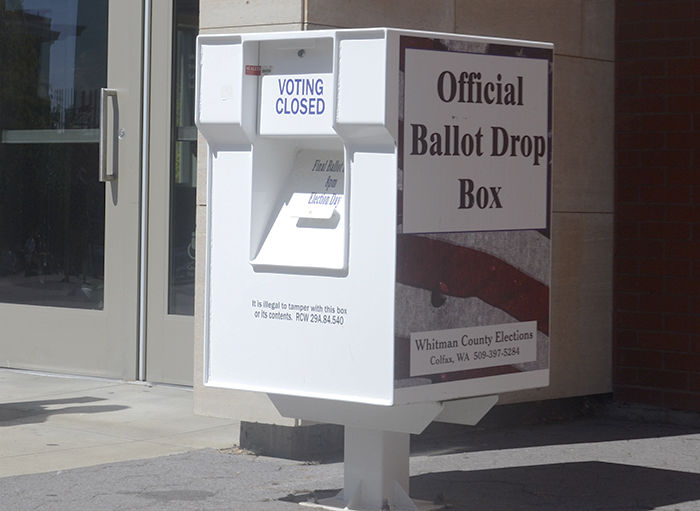Joke write-in votes reflect American discontent with candidates
The ballot box outside of the CUB as seen on Aug. 29. About 60 percent of eligible Washington voters did not vote in the 2014 mid-term elections, according to the Office of the Secretary of State of Washington.
December 1, 2016
On election day, voters took to Twitter and other social media platforms claiming they voted for Harambe, the gorilla killed at the Cincinnati Zoo in May.
Yes, you read that right, a dead gorilla received a significant number of votes for president, if these users were being honest.
Of course, there’s no way to confirm how many votes Harambe received this election, as most states require write-in candidates to register in order for their votes to be counted, and many more simply throw out joke votes like fictional characters, according to an Oct. 18 article from AOL News.
It’s no wonder people are turning to write-ins, jokes or otherwise – Hillary Clinton and Donald Trump both received unfavorable ratings from 58 percent of Americans, according to a July Gallup poll.
To make things worse, this isn’t the first time ridiculous ballot write-ins were projected during an election.
In previous years, write-ins such as Mikey Mouse, Jesus, Vladimir Putin, Harry Potter and “Nobody” have all received a considerable number of votes for president.
In fact, according to AlterNet, a political online magazine, 1.4 million Americans pledged to vote for Jesus Christ in the 2012 presidential election.
These individuals pledged to vote for Jesus to express their anger towards President Obama as well as their anti-Mormon stance, as the Republican presidential candidate at the time, Mitt Romney, is Mormon.
Voting for candidates such as these is the same as throwing one’s vote away and countless Americans continue to treat our elections as a joke.
This is primarily because people feel as though their individual vote doesn’t matter. This is likely due to the way that the president is selected via the Electoral College.
The Electoral College is comprised of 538 electors, with each senator receiving one vote and each member of the House of Representatives also receiving one vote.
It is the votes of these electors that make up the 270 votes required to secure the presidency.
This raises the question of why we have this type of indirect democracy, where the votes of elected representatives have more weight than the vote of the public.
Travis Ridout, an associate professor of politics, philosophy and public affairs at WSU, explained the purpose of the Electoral College.
“One reason given by the framers of the Constitution is that it gives electors, presumably individuals who are esteemed and who know the presidential candidates, a chance to exercise some oversight over the passions of the people,” Ridout said. “So if the people choose someone whom the elite deem dangerous, there is a chance for electors to reverse that decision.”
As a result of this type of representation, many Republicans who live in Democratic-leaning states and Democrats who live in Republican-leaning states feel as though their voices will never be heard and may choose not to vote at all.
According to a Nov. 12 article from the Washington Post, 43 percent of registered voters did not vote in this year’s election.
Even more pathetic is the number of people who don’t vote in mid-term elections, which occur during the years between presidential elections.
According to the Washington Office of the Secretary of State, approximately 60 percent of eligible voters chose not to vote in Washington’s 2014 mid-term elections.
Despite the fact that our president is not elected through popular vote, individuals should still use their vote to elect representatives that are like-minded in order to ensure their voices are heard.
The ability to vote is a freedom — numerous individuals sacrificed their lives to ensure that we, the American people, would have free and fair elections.
If American citizens ever want to have a president who reflects their personal interests and beliefs, they must begin taking elections seriously.
If you don’t vote, don’t expect elected officials to accurately represent your opinions.
Emily Hogan is a freshman genetics and cell biology major from Harrington, Delaware. She can be contacted at 335-2290 or by [email protected]. The opinions expressed in this column are not necessarily those of the staff of The Daily Evergreen or those of The Office of Student Media.










